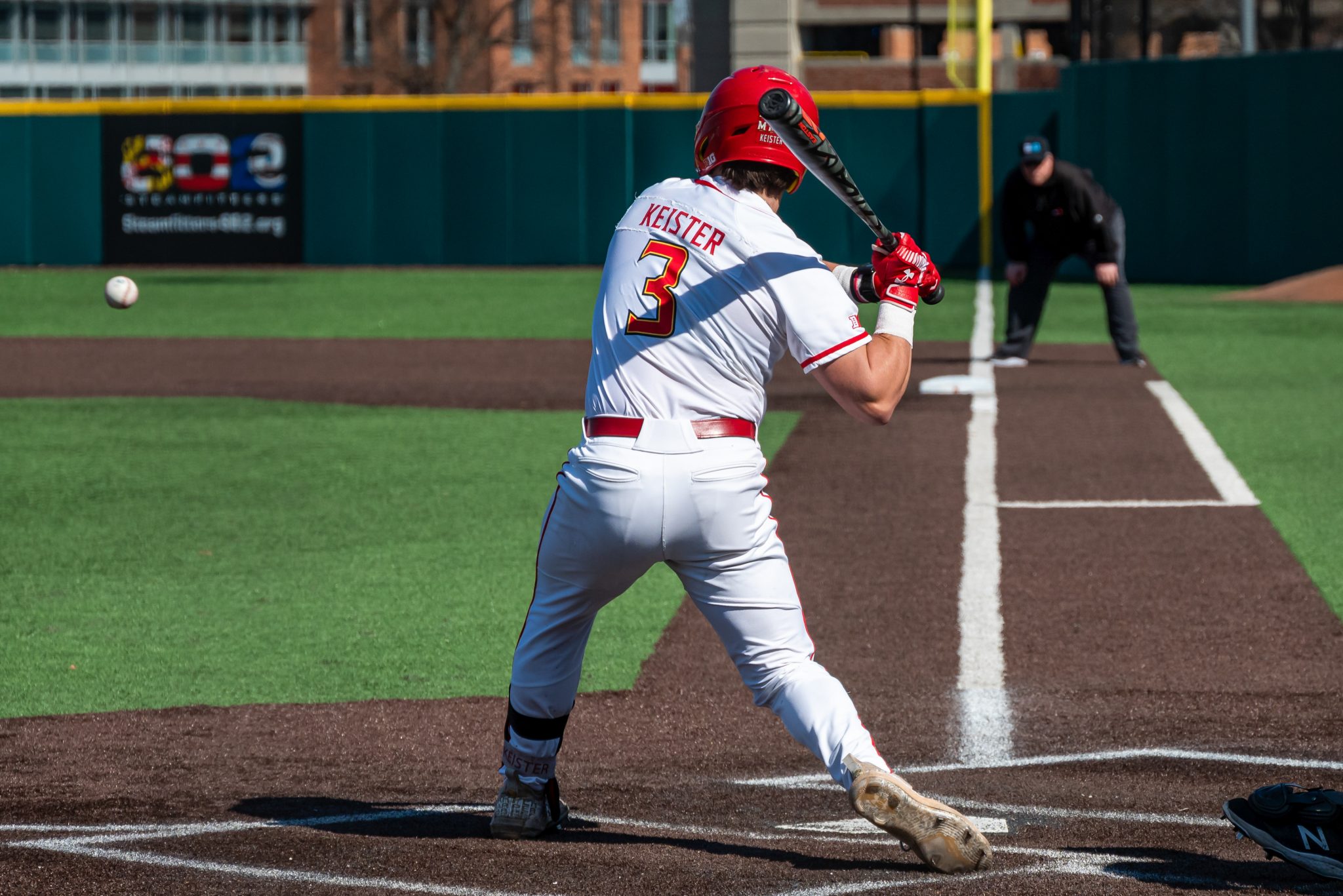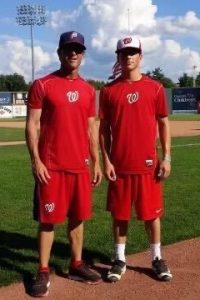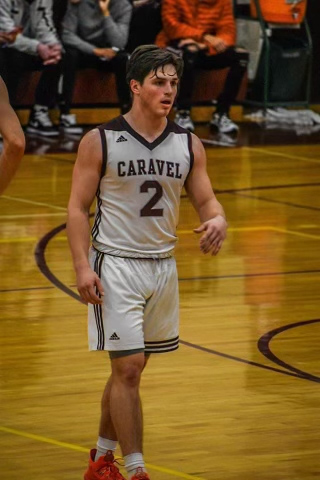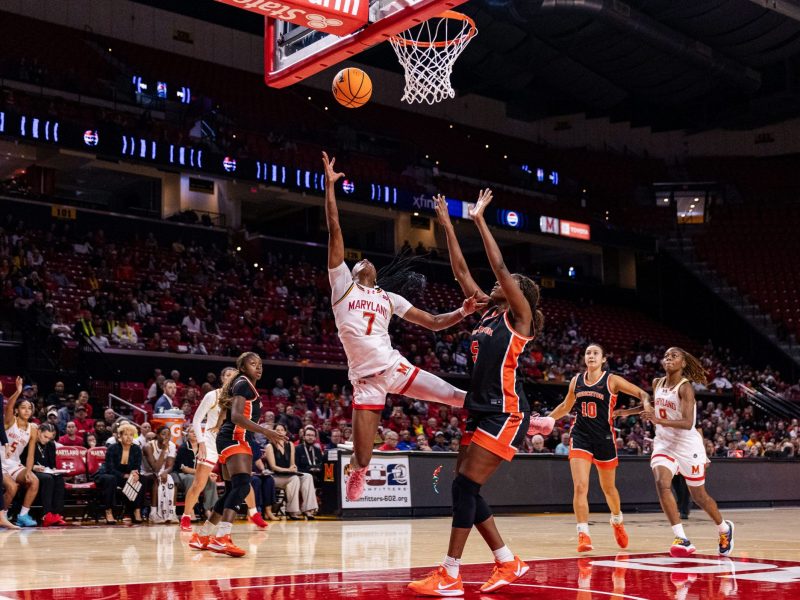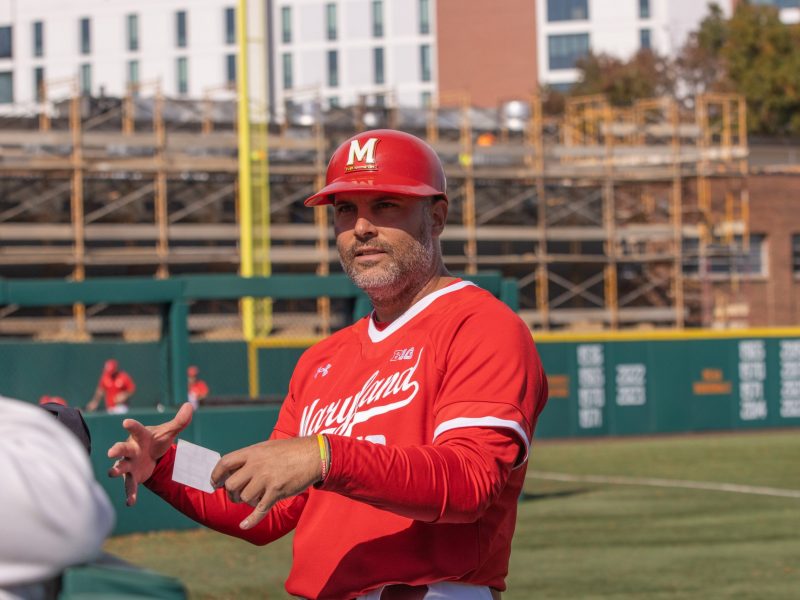Maryland baseball’s players cramped into Matt Swope’s basement for their team Christmas party last December. Terps memorabilia stretched across the walls while players and coaches donned ugly Christmas sweaters.
Some stood, others sat on the U-shaped couch and the rest settled on the carpet. Maryland men’s basketball’s game against Indiana played on the TV.
Swope stood before the congregation at the end of the night. The coach had an announcement.
He revealed a white Maryland jersey with Kevin Keister’s name on the back and a red No. 3 engraved — a number reserved for the team captain that the infielder coveted.
“Three has been the number that the captain wears and this year, we think the kid that deserves to wear it is [Kevin],” Keister recalled Swope saying.
Keister and Swope grew together over the last three years and have a shared competitiveness. That fierce drive created friction at first, but culminated in Keister being named the team’s leader. It’s a familiar position for the shortstop.
Swope was the first Maryland coach to call Keister during his high school career. He met the then-hitting coach on a visit in September 2018 and committed later that month.
Keister, who played second base his first three years with the Terps, didn’t see much time as a freshman. He recorded only four hits — each of them singles — all season.
Swope sought more power from Keister’s approach. The infielder recognizes now that he was a weak hitter entering college, but was satisfied with his swing and content with only hitting singles. The two argued over fine-tuning his approach.
“Early on, we were a little bit more alike than dissimilar and that’s what made us butt heads a little bit,” Swope said.
[Maryland baseball sweeps Bryant with 11-7 win in series finale]
Keister eventually caved to his coach’s persistence. The changes produced results.
He hit .317 as a sophomore after batting .098 in his debut season. Keister also knocked 11 home runs and 15 doubles.
While Keister’s swing improved, his work ethic had always been there. Swope never questioned his shortstop’s dedication. It’s in his lineage.
Keister’s father, Tripp Keister, was a 33rd-round draft pick by the New York Mets in 1992. Tripp Keister began coaching after a four-year minor league career and was hired as a minor league manager in the Nationals organization in 2012.
Kevin Keister watched and participated in the Potomac Nationals’ batting practice before games as a middle schooler. He hit with players such as Anthony Rendon and Victor Robles, both cornerstones of Washington’s World Series run.
Being around those professionals taught the teenager how to work harder and smarter. After doing warmups with the team, Kevin Keister often watched the first few innings of Potomac’s games from the dugout and headed to the weight room midway through, his father said. He didn’t want to stop training.
“You think you’re good? You need to work like we do,” Tripp Keister recalled players telling his son. “You need to lift and you need to get stronger.”
Kevin Keister applied those lessons playing basketball and baseball at Caravel Academy in Delaware. He joined both varsity teams as an eighth grader, a jump both coaches said was uncommon, and showcased his leadership early.
The shooting guard structured his weight lifting schedule around basketball practices. He lifted early in the morning or after practice ended at 7 p.m. to avoid disrupting his shot. His teammates followed his lead.
“Everything with him was very regimented,” Caravel basketball coach Mark Tobin said.
[Behind the technology guiding Maryland baseball’s pitching staff]
Keister was named a captain of the basketball team his senior year. He demanded more energy from his teammates, Tobin said. He also was the player to take critical shots.
During his junior season, Keister stood at the foul line against Glasgow in the final second of regulation with his team trailing by three. A win would send the Buccaneers to the state semifinal. He sank all three shots. Caravel won in overtime.
Earlier that season, Keister tied a game against Crisfield late with a pair of free throws. A younger teammate intentionally fouled, thinking Caravel was still trailing — a mistake that cost the Buccaneers the game.
Keister texted that teammate that night while others were upset. He emphasized the loss wasn’t on him.
“I was proud of him for doing that,” Tripp Keister said.
His leadership extended to the diamond. Paul Niggebrugge, who coached Keister in eighth and ninth grade, recalled a fierce competitor who hated losing.
“He couldn’t accept or tolerate not winning,” the coach said.
Niggebrugge depended on the inexperienced Keister to close out games. The wins Keister helped deliver on the mound pushed Caravel to a state title his freshman year.
He became the baseball team’s official captain as a junior.
It was clear to Chris Moxley that his shortstop was the team’s leader when he became Caravel’s coach during Keister’s sophomore season. He was in the weight room after late-night practices and games, consistently the last person to leave.
“It’s that willingness to just fight and want to win,” Moxley said. “He outworked just about everybody.”
Keister brought those traits to College Park. The senior stepped into a leadership role on his own before being given No. 3 when the team reconvened last summer, outfielder Elijah Lambros said.
Keister always comes to his pitcher’s aid after giving up a run, pitching coach Jimmy Jackson said. The captain reminds them the offense will have their back.
“He’s the guy that everyone wants around them,” right-hander Kenny Lippman said.
When the Terps gave up 12 runs to VCU in the seventh inning last month, Swope knew he didn’t have to give a motivational talk. Keister already did.
The two met in the Varsity Team House days after Swope named him team captain. Maryland’s coach asked if he actually wanted to wear the No. 3.
Swope, a Maryland native and former Terp, kept the tradition during the offseason despite the roster and coaching turnover. The number embodies what Swope said are the three pillars of Maryland baseball: ownership, toughness and a growth mindset. He wanted to keep that piece of the program that was present during its ascent in the last decade.
Keister watched a flock of teammates transfer after the coaching change. He never considered leaving.
His answer to Swope’s question about the number made both of them tear up. Four years ago, the pair disagreed on swing adjustments. Now, they hope to lead Maryland to heights it’s never reached.
“It means the world to me because this university means the world to me,” Keister said. “It’s the only place I want to be.”
